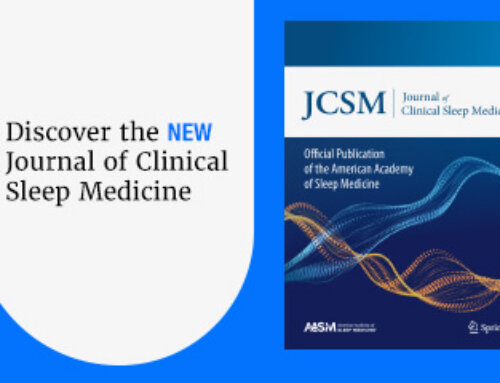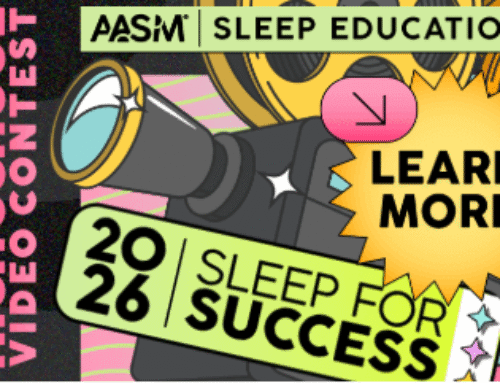FOR IMMEDIATE RELEASE
CONTACT: Lynn Celmer, 630-737-9700, ext. 9364, lcelmer@aasm.org
DARIEN, IL – A new study shows a strong association between severe, untreated obstructive sleep apnea and the risk of elevated blood pressure despite the use of high blood pressure medications.
The study involved patients who had cardiovascular risk factors or established heart disease and moderate or severe obstructive sleep apnea. Among participants prescribed at least three antihypertensives including a diuretic, resistant elevated blood pressure was more prevalent in those with severe sleep apnea (58.3 %) compared with moderate sleep apnea (28.6%). Further analysis found that the odds of resistant elevated blood pressure were four times higher in participants with severe, untreated obstructive sleep apnea even after adjusting for potential confounders such as body mass index, smoking status, diabetes mellitus, and cardiovascular disease (adjusted odds ratio = 4.12).
“Our findings suggest that severe obstructive sleep apnea contributes to poor blood pressure control despite aggressive medication use,” said first author Dr. Harneet Walia, assistant professor at the Cleveland Clinic Lerner College of Medicine of Case Western Reserve University. “This is an important finding from a clinical perspective as poor blood pressure control in patients taking multiple antihypertensive medications makes them particularly vulnerable to increased cardiovascular risk.”
Study results are published in the Aug. 15 issue of the Journal of Clinical Sleep Medicine, which is published by the American Academy of Sleep Medicine.
“High blood pressure that is resistant to treatment with medications is a strong warning sign for the presence of obstructive sleep apnea, a chronic disease that increases the risk for heart disease and stroke,” said American Academy of Sleep Medicine President Dr. Timothy Morgenthaler. “Over one-third of patients with hypertension and nearly eight out of 10 patients with treatment resistant hypertension have obstructive sleep apnea. People who have high blood pressure should talk to a doctor about their risk for sleep apnea.”
Data were analyzed from the baseline examination of the Heart Biomarker Evaluation in Apnea Treatment (HeartBEAT) study, a four-site randomized controlled trial comprising patients with moderate to severe OSA who were under cardiovascular disease management. The analysis involved 284 participants, of which 73 were prescribed an intensive antihypertensive regimen.
“Even under the close care of a cardiologist following national guidelines for treatment of cardiovascular risk and comprehensive medication regimens, severe levels of obstructive sleep apnea versus a moderate level of OSA appear to be contributing to suboptimal blood pressure control,” said Walia.
According to the Centers for Disease Control and Prevention, about 36 million American adults with high blood pressure don’t have it under control. The American Academy of Sleep Medicine reports that approximately 80 percent of people with drug-resistant high blood pressure have obstructive sleep apnea, which involves repetitive episodes of complete or partial upper airway obstruction occurring during sleep despite an ongoing effort to breathe.
Research funding was provided by the National Heart, Lung, and Blood Institute (NHLBI) of the National Institutes of Health (NIH) and the National Center for Research Resources (NCRR).
To request a copy of the study, “Association of Severe Obstructive Sleep Apnea and Elevated Blood Pressure Despite Antihypertensive Medication Use,” or the commentary, “Resistant Hypertension and Untreated Severe Sleep Apnea: Slowly Gaining Insight,” or to arrange an interview with the study author or an AASM spokesperson, please contact Communications Coordinator Lynn Celmer at 630-737-9700, ext. 9364, or lcelmer@aasm.org.
Note: Preliminary results of this study were published as an abstract and presented in June 2013 at SLEEP 2013, the 27th annual meeting of the Associated Professional Sleep Societies LLC.
The monthly, peer-reviewed Journal of Clinical Sleep Medicine is the official publication of the American Academy of Sleep Medicine, a professional membership society that improves sleep health and promotes high quality patient centered care through advocacy, education, strategic research, and practice standards (www.aasm.org). The AASM encourages patients to talk to their doctor about sleep problems or visit www.sleepeducation.org for a searchable directory of AASM-accredited sleep centers.




